 Glycolic Peel
Glycolic PeelThe Ultimate Guide To Topical Vitamins In Skincare
Here’s everything you need to know about some of the most highly regarded ingredients in your skincare routine.
Feel like you need a dictionary every time you look at the ingredient list of a beauty product? Still unsure of the difference between retinol and retinoids? What about the unique benefits of vitamins B, C, and E? Are alpha and beta hydroxy acids the same thing? The skincare aisle can be overwhelming, but you don’t need a PhD in cosmetic chemistry to navigate it. With expert help, The AEDITION is demystifying and simplifying the beauty industry — one label at a time.
You probably grew up taking multivitamins and maybe they’re still in your wellness routine today, but how familiar are you with the benefits many of those vitamins can have when applied topically on the skin? With new skincare products infiltrating the beauty space daily, finding ones that work best for your specific skin type and needs can be overwhelming. Yet understanding the ingredients that make up your favorite formulas can go a long way towards simplifying your shopping and improving your routine.
If you are a regular reader of The AEDITION, you know we deep dive into ingredients all the time. When it comes to one category of actives, we figured we’d consolidate everything you need to know into one place. To save you time (and confusion), we reached out to top dermatologists to curate a dictionary of the most popular topical vitamins found in skincare. Consider this your ultimate guide to the vitamins that deserve a spot in your regimen.
Vitamin A
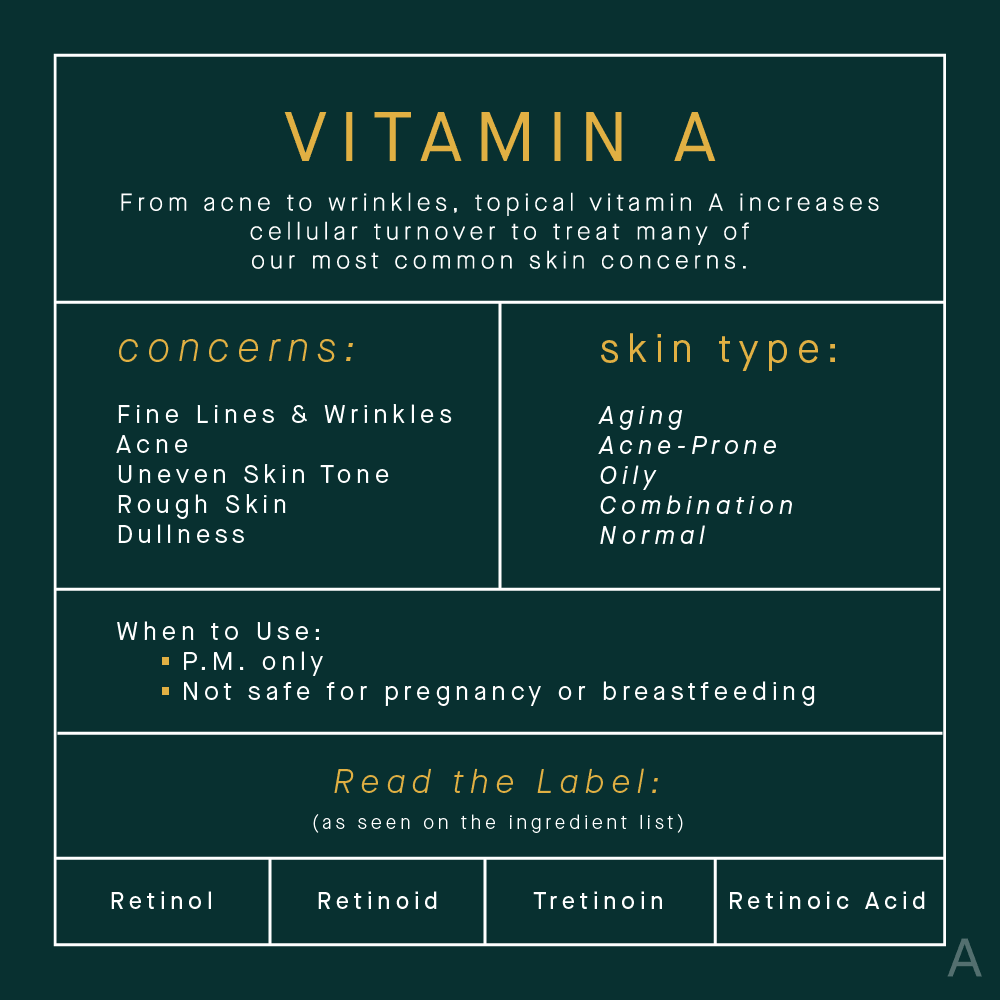
Let’s start with vitamin A. Most commonly seen on ingredient labels as ‘retinoid’ and ‘retinol,’ vitamin A derivatives are one of skincare’s most popular active ingredients of any kind. And it’s no wonder when you consider the host of benefits it provides. “Vitamin A plays a significant role in the aging process, so, in its topical form, vitamin A is a superstar ingredient for anti-aging,” says Dendy Engelman, MD, a board certified dermatologist in New York City. “It essentially tells your cells to act younger and healthier.”
The beauty of retinol and retinoids is that they can be used to treat everything from acne to wrinkles. As such, Dr. Engelman recommends patients “begin incorporating retinol into their skincare routines regularly starting in their twenties.” With consistent use, retinol helps thicken the skin, in addition to increasing cellular turnover, stimulating collagen production, boosting elasticity, and smoothing the appearance of fine lines and wrinkles.
Retinol is the form of vitamin A most commonly found in over-the-counter products (think: serums, creams, etc.), while retinoids are mostly found in prescription topicals. Regardless of what you choose, both should only be used at night because they increase photosensitivity (read: be extra diligent with your sun protection when using). Another important note: It can take some time for the skin to acclimate to retinol and retinoids. The so-called ‘retinization’ process can mean several weeks of dryness and sensitivity, but there are plenty of ways to minimize the effects. Learn more in our comprehensive guide to retinol and retinoids in skincare.
Beta Carotene
Retinol and retinoids may get the lion’s share of attention, but there is another member of the vitamin A family that should be on your radar. Beta carotene, the plant pigment that gives color to red, orange, and yellow vegetables, falls into the category of ‘provitamin A carotenoid’ — meaning that the body can convert it into vitamin A.
When applied topically, “it has antioxidant benefits for the skin, protecting against damage from free radicals that contribute to visible signs of aging and overall contributing to brighter skin,” Dr. Engelman shares. Unlike retinol and retinoids, beta carotene can be incorporated into your A.M. or P.M. routine, and she says it is often found in serums and creams.
Vitamin B3
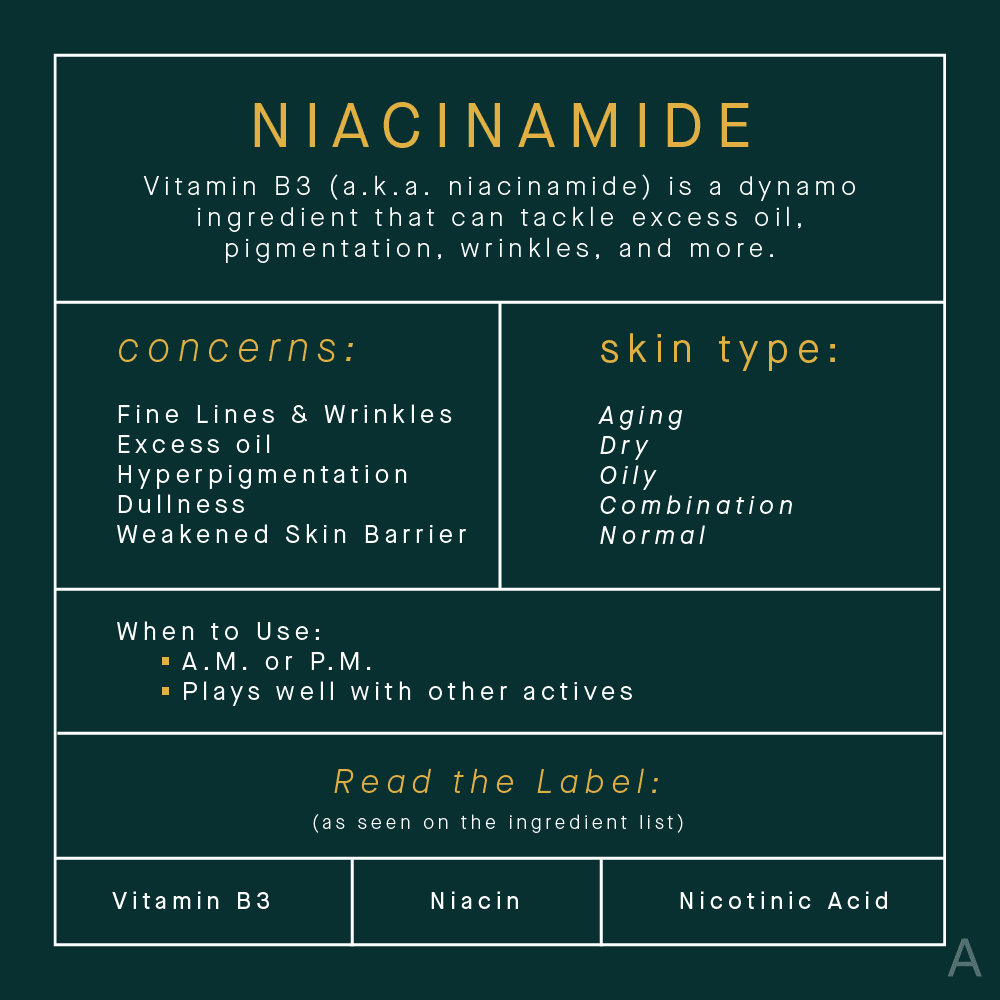
Also known as niacinamide, vitamin B3 is a dynamo skincare ingredient for its ability to gently tackle an array of common skin concerns. “It can serve as an antioxidant, anti-inflammatory, reduce pigmentation, may help with sebum and acne control, and improve signs of wrinkles,” says Jenny Liu, MD, board certified dermatologist in Minneapolis, MN. “[It] also increases ceramide production in the skin.”
One of the reasons for its versatility is that it “is involved in many metabolic processes in our body and skin,” Dr. Liu notes. Even so, the water-soluble vitamin is not naturally occurring in the body, so it must be consumed orally (via foods like fish, grains, avocado, mushrooms, and green peas) or applied topically (hi, skincare!).
Perhaps the best feature of niacinamide is that it pairs nicely with other ingredients in your morning or evening regimen. Because it plays wells with others, you’ll likely find niacinamide in multitasking serums, moisturizers, and at-home peels. In any of those cases, it can be used to soothe and reduce irritation. Learn more in our comprehensive guide to niacinamide in skincare.
Vitamin B5
Vitamin B5 (a.k.a. pantothenic acid) is a water-soluble vitamin that pulls double duty by acting as both a humectant that draws water into the skin and an emollient that locks it in. “As an emollient, it heals dry, damaged skin,” Dr. Engelman explains. “As a humectant, it attracts and binds water to the skin to aid in moisture retention, giving skin a plump, hydrated appearance.”
But vitamin B5 is not a one-trick pony. In addition to moisturizing the skin, Dr. Engelman says that it also reduces acne blemishes (particularly when taken as a dietary supplement) and calms skin conditions like rosacea and eczema. That soothing quality can be attributed to the fact that it has an anti-inflammatory effect that helps stimulate the body’s natural healing processes. It can be used to treat damage and trauma from ultraviolet (UV) radiation and is found in many after-sun treatments and sunburn ointments.
It should come as no surprise that vitamin B5 is found in an array of skincare formulas for both morning and evening. It plays well with other actives, but, for those looking for a serious hydration boost, consider pairing it with fellow humectants like hyaluronic acid (HA) and glycerin.
If you are curious about how panthenol fits into the vitamin B5 equation, it is a provitamin. Like beta carotene, it’s a substance the body converts into a specific vitamin — in this case, vitamin B5. Panthenol and pantothenic acid have the same biological activity, but panthenol is converted (via oxidation) to vitamin B5 in the skin. Thus, skincare products with either pantothenic acid and panthenol deliver similar benefits.
Vitamin C
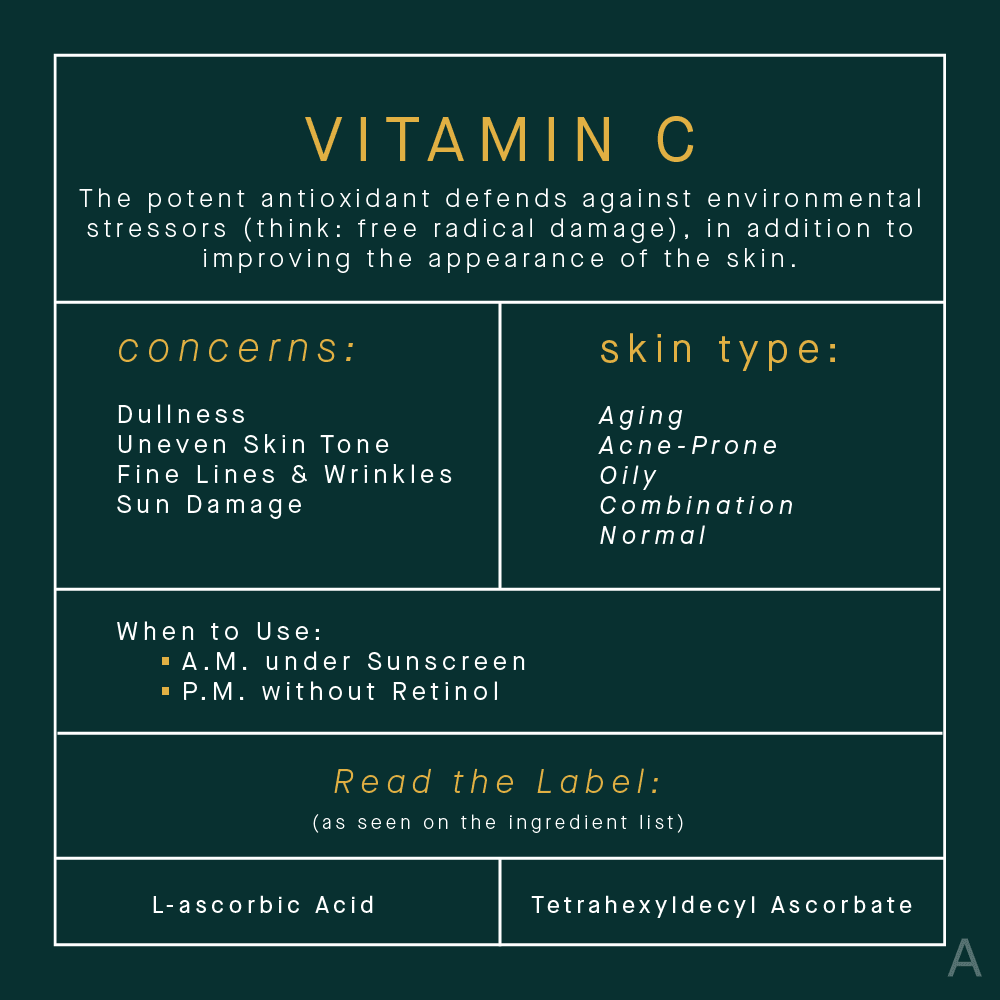
We have no doubt that you’ve heard of vitamin C before. It’s one of the undisputed stars of the topical vitamin set. The antioxidant is celebrated for its ability to “protect skin against oxidative damage from ultraviolet rays and pollution,” Dr. Liu says. It is also widely praised for brightening skin, lightening pigmentation, and promoting collagen production. That collagen boost leads to “thicker skin, diminished fine lines and wrinkles, and more youthful-looking skin,” Dr. Engelman adds.
While vitamin C has a host of benefits, it is a higher maintenance ingredient. The antioxidant is notoriously difficult to stabilize, which is why both the formulation and packaging of your vitamin C product matter. L-ascorbic acid is the most active and studied form of vitamin C, but it is tough to formulate it. A more stable alternative can be found in tetrahexyldecyl (THD) ascorbate, a chemically modified form of L-ascorbic acid that better penetrates the skin. Vitamin C serums tend to pack the most potent punch, but the active can be found in creams, masks, and peels, too. Depending on your skin type, vitamin C may be irritating. So, you may wish to patch test the product on a small area of skin first.
Because vitamin C oxidizes on contact to the air and exposure to light can degrade its benefits, look for products that are in airtight, dark or opaque glass jars or vials. Additionally, store it in a cool, dry space (i.e. not your steamy bathroom medicine cabinet).
Vitamin C can be used A.M. or P.M., but one of its most noteworthy traits is how it can improve your sun care. Studies have shown that layering antioxidants, like vitamin C and vitamin E, with sunscreen provides four times (!) the protection of sunscreen alone. Learn more in our comprehensive guide to vitamin C in skincare.
Vitamin D
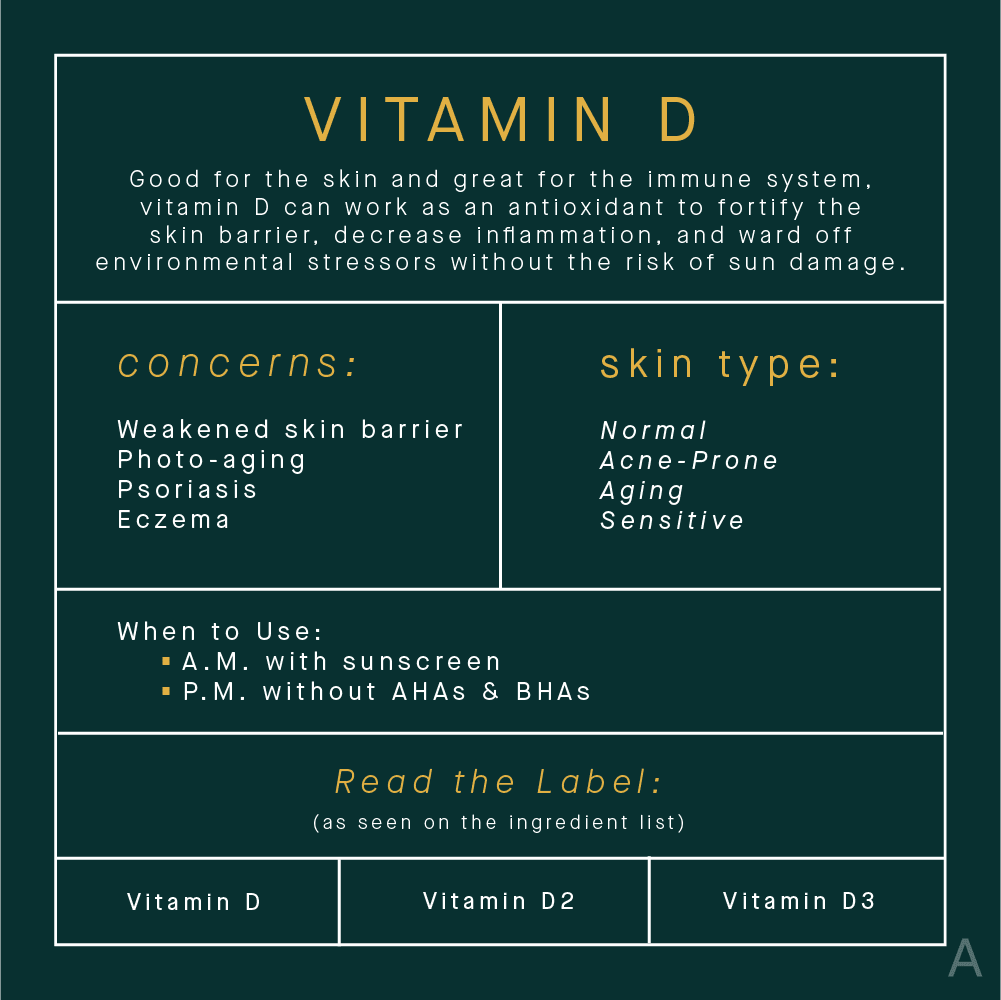
As Dr. Engelman explains, this fat-soluble vitamin plays a significant role in rejuvenating skin cells and protecting the skin — and maintaining vitamin D levels isn’t just about bathing in the sunshine. While vitamin D is often considered to be sourced from the sun, it’s a vitamin that can also be found in food, dietary supplements, and topical products.
When applied topically, vitamin D acts as an antioxidant that can fortify the skin barrier, decrease inflammation, and ward off environmental stressors. Since vitamin D gently boosts cell turnover and reduces inflammation, it especially helps patients with skin concerns such as acne, psoriasis, and eczema. “It is found in prescription treatments for inflammatory skin conditions, like psoriasis, and can also be purchased over-the-counter in serums and creams,” Dr. Engleman says.
When it comes to adding vitamin D into your skincare routine, be mindful of the other ingredients in your regimen. You can use it morning and night, but it is believed that alpha and beta hydroxy acids acidify and deactivate vitamin D. Learn more in our comprehensive guide to vitamin D in skincare.
Vitamin E
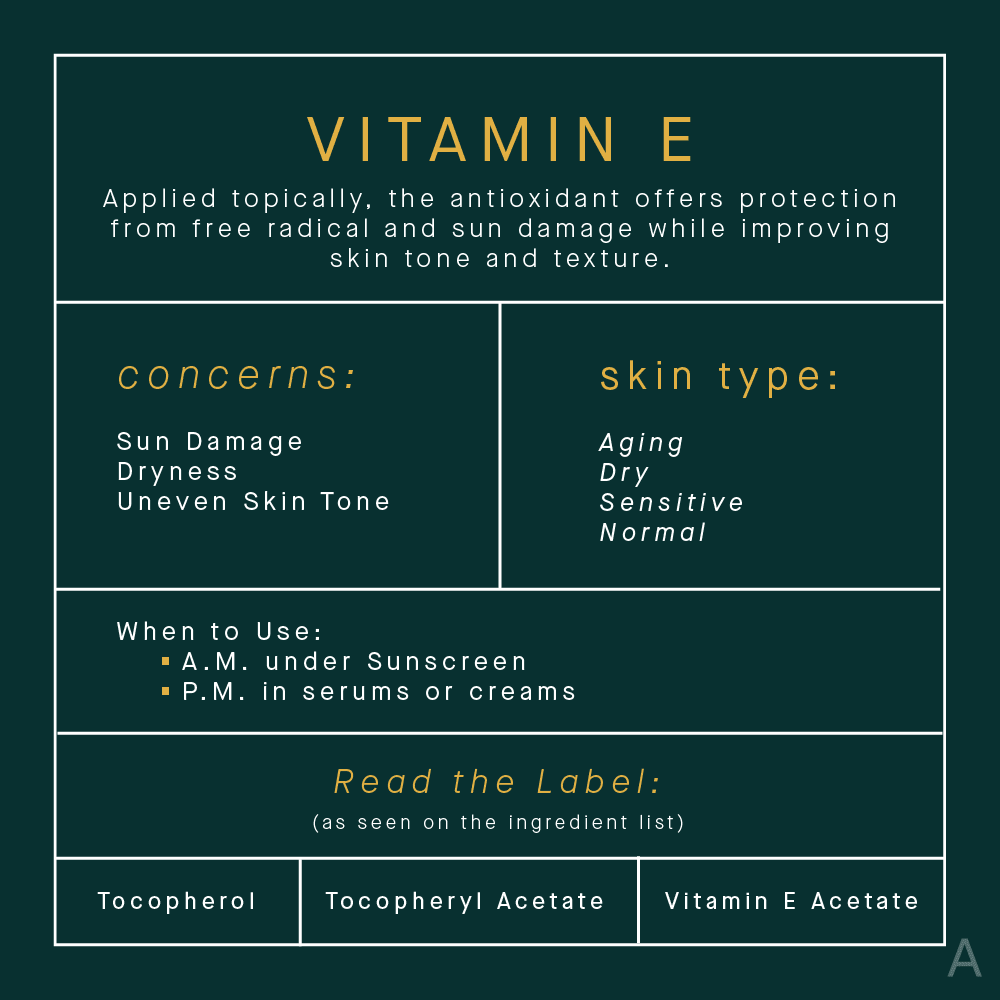
Vitamin E, or alpha-tocopherol, is a fat-soluble vitamin with antioxidant properties. It is found naturally in many foods, including green, leafy vegetables, nuts, seeds, meats, eggs, and vegetable oils. But, like so many of the vitamins on this list, your skin will likely benefit from topical application.
From fighting free radical damage to keeping wrinkles at bay, topical vitamin E is a skincare staple for a reason. As an antioxidant, it protects the skin from UV damage and lipid oxidation and, as Dr. Liu explains, “also helps to replenish other antioxidants, such as vitamin C.” In case you’re wondering, yes, that’s why vitamins C and E are commonly formulated together.
One of the things that is special about vitamin E is its role in maintaining a healthy skin barrier. It acts like an emollient or glue, “holding together the building blocks of the epidermis — ceramides, cholesterol, and fats,” Dr. Engelman shares. Basically, the powerhouse neutralizes free radicals, improves skin tone and texture, and helps ensure optimal barrier function.
While vitamin E is much less finicky than vitamin C, it does keep best when it's in darker or opaque packaging and stored in a cool, dry place. Antioxidants like vitamin E offer protective power during the day, but they are also reparative at night. Learn more in our comprehensive guide to vitamin E in skincare.
Vitamin K
Vitamin K fat-soluble vitamin that plays an important role in many bodily functions, including blood clotting, blood calcium regulation, and bone health. While its topical benefits are not as well-researched as its systemic ones, Dr. Engelman says “vitamin K is best known in skincare for its skin-brightening properties.”
As both an antioxidant and anti-inflammatory, it is used to promote wound healing, lighten under-eye circles, fade hyperpigmentation, and minimize the appearance of stretch marks. While the jury is still out on just how useful it is, vitamin K is very low risk. When applied topically, it is non-irritating and considered safe for all skin types (including sensitive). Thanks to its brightening properties, you’re most likely to find it in eye creams.
The Takeaway
The topical application of vitamins can go a long way towards correcting and preventing a number of skin concerns. While it is important to safely and mindfully add new ingredients into your routine, one of the benefits of these actives is that they tend to work well together. “Most of these vitamins can be used together and actually work synergistically to improve skin,” Dr. Engelman explains, noting that vitamins C, E, and K are common pairings.
Generally speaking, both of our experts caution against using vitamin A derivatives with other active ingredients since it can cause irritation and damage to the skin, but “any of the vitamins discussed above should pair well with vitamin A,” Dr. Engelman notes. Consult with a board certified dermatologist or skincare professional to determine the best vitamin pairings for your skin type and concerns.
More Related Articles
Related Procedures

AI Plastic Surgeon™
powered by'Try on' aesthetic procedures and instantly visualize possible results with The AI Plastic Surgeon, our patented 3D aesthetic simulator.

